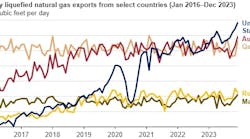Patrick Crow
OGJ Online
Washington, DC�The US Senate will be pushing this summer to approve permanent normal trade relations (PNTR) with China, and China is expected to enter the World Trade Organization later this year. Considering the likely outcomes of these events, Honolulu's FACTS Inc. believes the lowering of trade barriers such as import quotas and import rights will be more significant than tariff reductions.
The Senate will be pushing to approve PNTR with China in the face of an election-shortened legislative calendar. Last month the House of Representatives approved PNTR in a 237-197 vote.
US businesses, facing competition from Chinese imports and wanting more access to the growing 1.3 billion-person Chinese market, had pushed for approval. Opposing it were some unions, human rights activists, and environmentalists.
Since 1979, Congress has granted normal trading privileges to China in annual votes. The permanent status would give Chinese goods low-tariff access to US markets and would require China lower its tariffs on US products and services.
Last year, China sold the US $82 billion worth of goods and services, and the US exported about $13 billion worth to China.
China is expected to enter the World Trade Organization later this year. WTO members must grant each other �unconditional� low-tariff access to their markets, and the annual US approvals would place it in noncompliance with WTO.
Senate outlook
About 70 of the 100 senators appeared to favor PNTR status, so eventual passage seemed likely.
Senate Majority Leader Trent Lott (R-Miss.) has said the Senate has no time for leisurely consideration. Congress is due to adjourn Oct. 6, but due to summer recesses, only 11 legislative weeks remain.
The House bill was referred to the finance and foreign relations committees.
Lott wants to avoid a long debate on the Senate floor or amendments that would complicate prospects of merging the House and Senate bills. Opponents already are planning an amend-and-delay strategy.
Sen. Paul Wellstone (D-Minn.) pledged to �fight hard to make sure I have the opportunity to be involved in a thorough debate and to introduce amendments.�
Sen. Jesse Helms (R-NC), the Foreign Relations Committee chairman, said, �I do not intend to allow the Senate to simply rubber-stamp the president�s plan to reward the Chinese communists in Beijing with permanent 'most favored nation' trade status.� Helms said he wants the Senate to consider China�s use of prison slave labor, suppression of religious freedom, oppression of political dissent, sale of weapons to rogue nations, and threats to invade Taiwan.
Most of the Senate�s initial focus will be in the Finance Committee, which already has reported out a China trade bill.
Chairman William Roth (R-Del.) said, �The House has added considerably to what I would have preferred, which was a clean bill that would have guaranteed American market access. I hope to see China PNTR move on to the floor of the Senate as expeditiously as possible.�
Roth and Charles Grassley (R-Iowa), the international trade subcommittee chairman, plan to oppose further amendments to the House bill.
EU deal
Last month, China agreed to open about 10% of its crude trade to foreigners as part of an pact with the European Union for WTO membership.
Under the deal, China gradually would decontrol oil, allowing foreign firms to sell oil directly to refiners and large customers rather than going through state firms. The agreement would give private companies 20% of China's refined product import market initially, rising by 15%/year.
Foreign firms could sell crude to about 60 small refineries, with total capacity of about 300,000 b/d, that are affiliated with local governments and are outside control of China National Petroleum Corp. (CNPC) and China Petrochemical Corp. (Sinopec).
A recent paper by think-tank FACTS Inc. noted that China�s WTO membership will greatly impact the oil industry, which is one of the most heavily regulated and protected industrial sectors.
�The impact of China�s WTO membership on the Chinese petroleum industry is generally divided into two trade effects: trade and market," said FACTS. �So far, China�s overall commitment for joining WTO is to reduce its average import tariff rate of all goods from 22.1% to 17% and reduce the rate further in the future. WTO member economies are also required to reduce their nontrade barriers, which may prove to be challenging for China.�
Tariffs
The FACTS paper said, �The reduction of import tariffs alone will have little impact on crude oil and natural gas trade but will have somewhat bigger impacts on refined product trade.
�For crude oil, China currently imposes a specific import tariff of 16 yuan/tonne (26�/bbl), which translates into a nominal tariff rate of about 1% at the present international price for Chinese Daqing crude.�
It said even an elimination of the import duties would have little impact on China�s crude trade. China has no gas imports, but the paper said ending the import tariff of 6% would increase the competitiveness of imported LNG in the future.
Import tariffs on refined products range from 6% to 12%, vs. 9% for gasoline.
�Reduction of these rates will impact the competitiveness of the imported products and force the Chinese state refiners to lower their product costs in order to compete.�
The paper said the lowering of trade barriers such as import quotas and import rights will be more significant than tariff reduction.
Competition
FACTS said Chinese state oil companies have little time to face the challenge of foreign competition in 3-5 years after China joins WTO.
�As they currently stand, CNPC and Sinopec cannot compete effectively with foreign companies without government protection. Increasing efficiency, reducing production costs, [and] improving management at all levels are the key requirements for revitalizing the Chinese oil industry, but to achieve these goals is easier said than done.
�The continuous restructuring of CNPC, Sinopec, and China National Offshore Oil Corp., through asset reorganization, the separation of core business from noncore business, the establishment of shareholding companies, and overseas stock listing are attempts by the state oil companies to move to the era of free market competition. Although the restructuring move is in the right direction, the task is tough for both CNPC and Sinopec and it is far from clear if their endeavors will be successful.
�In our opinion, dividing the two giant state oil companies along geographical lines may have been an error to begin with," said FACTS. The right approach should have been a reorganization along functional lines, not regions.
�Making the Chinese oil industry competitive under the current organizational structure may prove to be a impossible challenge.�

